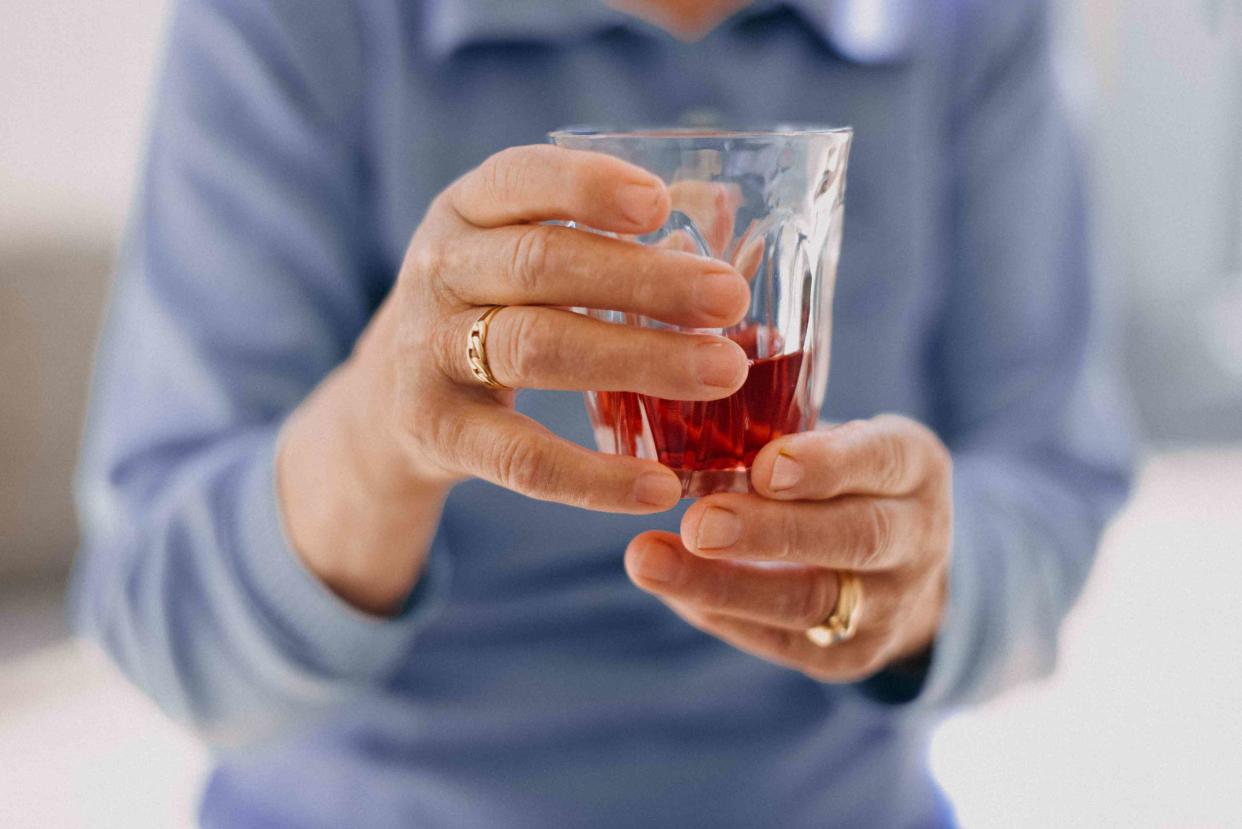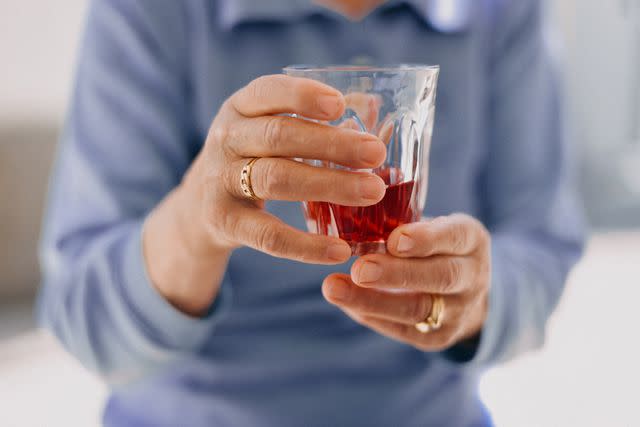7 Cranberry Juice Benefits

Stefania Pelfini, La Waziya Photography / Getty Images
Medically reviewed by Roxana Ehsani, MS
Cranberry juice is a rich source of vitamin C, an antioxidant that plays a vital role in immune health. One cup of unsweetened cranberry juice provides 23.5 milligrams or 26% of the daily value (DV) for vitamin C.
Although commonly known for its ability to prevent urinary tract infections (UTIs), regular cranberry juice consumption may also offer benefits for sexual, digestive, and heart health.
This article discusses the benefits of cranberry juice, including the best type to consume, recommended daily intake, and possible side effects.

Stefania Pelfini, La Waziya Photography / Getty Images
Cranberry Juice Benefits: Sexual Health
While some suggest that concentrated cranberry juice can improve vaginal odor and taste, no scientific evidence supports this claim.
However, a study found that cranberry juice may improve the health of the vaginal microbiome in women with dysbiosis (imbalances in microbial communities). Vaginal dysbiosis can lead to conditions such as bacterial vaginosis (BV), a common vaginal infection that can cause odor.
Cranberry Juice Benefits: Digestive Health
Cranberries contain antioxidant compounds called polyphenols that have been shown to have potential benefits for digestive health.
A study funded by a cranberry juice company found that drinking cranberry juice was associated with increased beneficial gut bacteria and improved constipation. Slight improvements in inflammatory markers were also observed.
Cranberry Juice Benefits: Heart Health
Research funded by a cranberry juice company found participants who consumed cranberry juice twice daily had lower levels of several risk factors for heart disease, stroke, and diabetes than those who received a placebo.
A systematic review and meta-analysis found that cranberry supplementation may improve body weight and blood pressure levels. Cranberries may also help improve high-density lipoprotein (HDL) cholesterol—considered "good" cholesterol—in younger adults. Further studies are needed to confirm these findings.
Cranberry Juice Benefits: Immune Health
Cranberry juice is a good source of vitamin C, which is important for immune system function. Research suggests that inadequate vitamin C consumption can lead to impaired immunity and a higher risk of infections.
Cranberry Juice Benefits: Infection Prevention
One study noted that components of cranberry, particularly proanthocyanidins, can promote oral health. That's because they possess antibacterial activity and can prevent bacteria from binding together, reducing periodontitis (gum disease) and the formation of dental plaque.
In addition, a 2020 review concluded that cranberry juice might be beneficial as a complementary means of suppressing Helicobacter pylori (H. pylori), a type of bacteria that can cause infection in your stomach. However, it's important to note that cranberry juice should not be used in place of antibiotics prescribed by your healthcare provider.
Cranberry Juice Benefits: Prevention of UTIs
Cranberry is the best-studied home treatment for UTIs. It is believed that the chemical compounds known as proanthocyanidins in cranberries can help prevent certain bacteria from sticking to the lining of the urinary tract, thus reducing the risk of UTIs.
A study found cranberry products in the form of juice or tablets may lower the risk of UTIs in at-risk groups by approximately 30%. At-risk groups include those with recurrent UTIs, pregnant women, older adults, and individuals with chronic indwelling catheters (devices used for short-term bladder drainage) and neurogenic bladder (conditions in which people lack bladder control due to problems in the brain, spine, or spinal cord).
In 2020, the Food and Drug Association (FDA) announced it would allow cranberry juice manufacturers to make qualified health claims about UTI prevention.
No evidence suggests that cranberries or cranberry juice can effectively treat an existing UTI.
Cranberry Juice Benefits: Skin Health
Thanks to its high antioxidant content, cranberry juice may help protect your skin against damage caused by free radicals that contributes to premature aging.
The vitamin C in cranberry juice is also needed for collagen production. Collagen is a type of protein that provides strength, elasticity, and structural support to the skin, helping to keep it firm and smooth.
One cup of unsweetened cranberry juice provides:
Calories: 116
Protein: 1 gram
Fat: 0.5 grams
Carbohydrates: 30 grams
Fiber: 0.3 grams
Sugar: 30 grams
Vitamin C: 26% of the DV
Vitamin E: 20% of the DV
Daily Amount of Cranberry Juice
There is no official recommendation on the timing or the optimal amount of cranberry juice a person should consume for health benefits. However, most studies examining the potential benefits of cranberry juice have used amounts ranging from 8 to 16 ounces, or about 1 to 2 cups per day.
Side Effects From Too Much Cranberry Juice
Cranberry juice is generally considered safe for most healthy individuals. However, consuming excessive amounts of it and other cranberry products can cause gastrointestinal symptoms such as upset stomach and diarrhea. These symptoms are more likely to occur in young children.
Cranberry juice with large amounts of added sugar can contribute a significant amount of calories and sugar to your diet, leading to weight gain and other health concerns.
Cranberry juice may intensify the effects of Jantoven (warfarin), a blood-thinning medication. If you take blood thinners, speak with your healthcare provider about how much cranberry juice is safe for you.
Cranberry Juice Recipe for All the Benefits
Consider making your unsweetened cranberry juice to get the most health benefits. Here are the steps to make homemade cranberry juice:
Combine 2–3 cups of frozen or fresh cranberries in a large pot with 8–10 cups of water.
Cook on low-medium heat for 45 minutes to an hour or until cranberries are softened.
Remove the pot from the heat and let it cool for a few minutes.
Use a strainer to separate the juice from the cranberry pieces (optional).
If desired, add honey to sweeten the juice to taste.
Juice can be served hot or cold.
Which Source of Cranberry Juice Is Best?
If you prefer the convenience of store-bought cranberry juice, it's important to carefully read the product label and look for pure, 100% cranberry juice.
Avoid cranberry juice cocktails as these are often mixed with other juices, such as grape juice and apple juice, and contain added sugars that can take away from the benefits of pure cranberry juice.
If you find pure cranberry juice too tart, dilute it with water to make it more palatable.
Examples of common added sugars include:
Brown sugar, cane sugar, raw sugar
Cane juice
Corn syrup, high-fructose corn syrup, maple syrup, malt syrup
Dextrose, fructose, glucose, maltose, sucrose, lactose
Fruit nectars
Honey
Molasses
Summary
Cranberry juice is a rich source of vitamin C and has a range of potential health benefits, including promoting sexual, digestive, heart, immune, and skin health. It may also help prevent urinary tract infections. To avoid excess consumption of added sugars and maximize the potential benefits of cranberry juice, it is best to choose pure, unsweetened cranberry juice.
While cranberry juice is safe for most people, consuming too much can lead to side effects, like upset stomach and diarrhea. Additionally, it can interact with certain medications, such as blood thinners.

